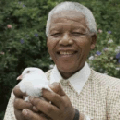321 - Mandela (2/2)
321 - Mandela (2/2)
321 - Mandela (2/2)
321 - Mandela (2/2)
SPOT 7
SPOT 7
LOCUTOR Aprendí que el coraje no es la ausencia de miedo, sino el triunfo sobre él.
||||courage|||the|absence|||||||
ANNOUNCER I learned that courage is not the absence of fear, but the triumph over it.
Valiente no es quien no siente miedo, sino quien conquista ese miedo.
|||||||but|who|conquers||
Brave is not the one who does not feel fear, but the one who conquers that fear.
LOCUTORA Nelson Mandela
SPOT 8
LOCUTOR Es mejor liderar desde atrás y poner a otros al frente, sobre todo cuando se gana y ocurren cosas bonitas.
|It is||to lead||||||||front|||when||||||
ANKÜNDIGER Es ist besser, von hinten zu führen und andere in den Vordergrund zu stellen, besonders wenn Sie gewinnen und schöne Dinge passieren.
ANNOUNCER It is better to lead from behind and put others in front, especially when you win and nice things happen.
Toma la primera línea cuando hay peligro.
|||line|||
Nehmen Sie die erste Linie, wenn Gefahr besteht.
Take the first line when there is danger.
Entonces, la gente podrá apreciar tu liderazgo.
Then||||appreciate||leadership
Dann werden die Leute Ihre Führung zu schätzen wissen.
Then, people will appreciate your leadership.
LOCUTORA Nelson Mandela
SPOT 9
LOCUTOR Después de escalar una montaña muy alta, descubrimos que hay muchas otras montañas por escalar.
ANNOUNCER After climbing a very high mountain, we discovered that there are many other mountains to climb.
LOCUTORA Nelson Mandela
SPOT 10
LOCUTOR Siempre supe que algún día volvería a sentir la hierba bajo mis pies y caminaría bajo el sol como un hombre libre.
|Always|||||would return|||||||||I would walk|||||||
ANKÜNDIGER Ich wusste immer, dass ich eines Tages das Gras unter meinen Füßen spüren und in der Sonne gehen würde wie ein freier Mann.
ANNOUNCER I always knew that one day I would feel the grass under my feet again and walk under the sun like a free man.
LOCUTORA Nelson Mandela
ANNOUNCER Nelson Mandela
SPOT 11
LOCUTOR Una persona con educación no puede ser oprimida porque es capaz de pensar por sí misma.
|||||not|||oppressed|||capable||think|||
ANKÜNDIGER Ein gebildeter Mensch kann nicht unterdrückt werden, weil er in der Lage ist, für sich selbst zu denken.
ANNOUNCER A person with education can not be oppressed because they are capable of thinking for themselves.
LOCUTORA Nelson Mandela
SPOT 12 LOCUTOR La muerte es algo inevitable.
SPOT 12 ANNOUNCER Death is inevitable.
Cuando un hombre ha hecho lo que él considera como su deber para con su pueblo, puede descansar en paz.
|||||||||||||||||rest||
Wenn ein Mann getan hat, was er seinem Volk gegenüber für seine Pflicht hält, kann er in Frieden ruhen.
When a man has done what he considers his duty to his people, he can rest in peace.
Creo que he hecho ese esfuerzo y, por tanto, dormiré por toda la eternidad.
||I|||||for||I will sleep||||eternity
I believe that I have made that effort and, therefore, I will sleep for all eternity.
LOCUTORA Nelson Mandela
Una producción de RADIALISTAS APASIONADAS Y APASIONADOS / www.radialistas.net

